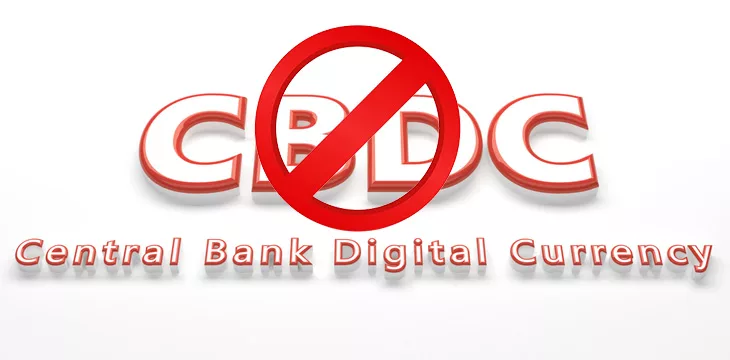|
Getting your Trinity Audio player ready...
|
The CBDC Anti-Surveillance State Act, introduced by the United States House Majority Whip Tom Emmer in 2023, could be up for a vote alongside a bipartisan and much-anticipated stablecoin bill, potentially derailing support for the latter. This comes as Federal Reserve Chair Jerome Powell reiterated the U.S. central bank was “nowhere near” a CBDC.
A mooted push by House Republicans for an anti-central bank digital currency (CBDC) bill could disrupt bipartisan support for a much-anticipated stablecoin bill, according to the Washington Research Group of investment bank TD Cowen.
The CBDC Anti-Surveillance State Act was introduced by Majority Whip Tom Emmer (R-MN) and approved by the U.S. House Financial Services Committee (FSC) last September. If passed into law, it would prevent the issuance of a CBDC without the explicit authorization of Congress.
The bill faced criticism from Democrats, including Rep. Stephen Lynch (D-MA), who cautioned against “false narratives and fearmongering, much of it coming from the cryptocurrency industry itself.”
Despite such warnings, in March, Sen. Ted Cruz (R-TX), along with four other U.S. senators (all Republican), backed the bill, introducing it to the Senate for consideration. The senators described the idea of a digital dollar as the Biden administration’s attempt to surveil Americans’ spending habits.
Last week, it was rumored House conservatives were floating a potential vote on the anti-CBDC bill alongside House Financial Services Chair Patrick McHenry’s (R-NC) flagship and long worked on, stablecoin legislation.
The Clarity for Payment Stablecoins Act of 2023 was authored by McHenry and, after much wrangling in committee, now has bipartisan support. If enacted, the bill would create a regulatory framework for the issuance and oversight of payment stablecoins.
“Our concern is that linking a ban on a digital dollar to the stable coin legislation could derail bipartisan support for the bill as Democrats generally see value to at least exploring a central bank cryptocurrency,” said the TD Cowen Washington Research Group, in a note
published by The Block on Monday.
Rep. Lynch (D-MA) was also critical of the idea, describing the proposed package as “ridiculous.”
It is yet to be confirmed if the CBDC and stablecoin bills will be tied into a single package to be voted on, but if it were to go ahead, it could prove a frustration for advocates of either or both pieces of digital asset legislation.
CBDC controversy in the US
Resistance to a digital dollar has been vocal on Capitol Hill, with Republicans particularly concerned that an increased ability for government to monitor citizens’ spending could lead to an erosion of liberty and a slide towards a Chinese-style surveillance state.
Fuel was added to this fire when the Federal Reserve released a report in February examining the potential ramifications—positive and negative—of a CBDC pegged 1:1 with the U.S. dollar, which raised alarm bells with critics that the digital dollar might already be in the works.
In an attempt to calm the storm, on March 7, Fed Chairman Jerome Powell told a Senate banking committee hearing that the Fed was “nowhere near recommending or let alone adopting a central bank digital currency in any form.”
Powell said that the Fed would only launch a CBDC “through the banking system” to ensure a different scenario than China’s digital yuan, which allows the government to “see all your transactions.” Powell added that the “last thing” the Fed wants is “to have individual accounts for all Americans, or any Americans for that matter. Only banks have accounts at the Fed, and that’s the way we’re going to keep it.”
However, only a few days later, on March 13, the furor was reignited as Rep. Emmer (R-MN) posted a photo on X (formerly Twitter) of a document he claimed was presented to his staff at an unspecified date by Fed representatives. The document is titled “Key Duties of the Fed—Payment Systems,” and the last item on the apparent ‘to-do’ list was “Central bank digital currency (CBDC).”
“If you don’t think the Fed is pursuing a CBDC, think again,” said Emmer, who claimed the document exposed the lie behind Powell’s Senate testimony the previous week.
In response, Powell felt compelled to reiterate that the Fed is not attempting to sneak a CBDC past Congress, stating on March 20:
“We haven’t come to a conclusion that we should propose…that Congress consider legislation to authorize a digital dollar. And it would take legislation by Congress signed by the president to give us the ability to do what we think of as a CBDC, which is really a retail CBDC, with the public. So we’re just a long, long way from that.”
Despite—largely Republican—fearmongering in the U.S., CBDC projects and pilots have been gathering pace across the globe, including in India, the United Kingdom, Switzerland, and the EU. If U.S. policy continues to be driven by the whims and concerns of Republican libertarians—and a notable Presidential candidate—the country could risk its monetary system falling behind due to largely unfounded fears.
To learn more about central bank digital currencies and some of the design decisions that need to be considered when creating and launching it, read nChain’s CBDC playbook.
Watch: Finding ways to use CBDC outside of digital currencies

 07-02-2025
07-02-2025 





